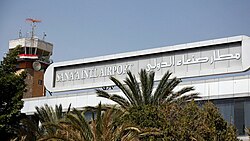Sanaa International Airport
Airport in Yemen From Wikipedia, the free encyclopedia
Sanaa International Airport (IATA: SAH, ICAO: OYSN) is the primary international airport of Yemen located in Sanaa, the capital of Yemen. It serves Sanaa City, as well as the entire population of the northern provinces of Yemen. Initially, a small passenger terminal was built in the 1970s. The runway is shared with the large Al-Dailami Air Base.
This article may be affected by a current event. Information in this article may change rapidly as the event progresses. Initial news reports may be unreliable. The last updates to this article may not reflect the most current information. (May 2025) |
Sanaa International Airport مطار صنعاء الدولي | |||||||||||
|---|---|---|---|---|---|---|---|---|---|---|---|
 | |||||||||||
| Summary | |||||||||||
| Airport type | Public/Military | ||||||||||
| Owner | Yemeni Government | ||||||||||
| Serves | Sanaa | ||||||||||
| Location | Sanaa | ||||||||||
| Opened | 1964 | ||||||||||
| Hub for | Yemenia | ||||||||||
| Elevation AMSL | 7,216 ft / 2,199 m | ||||||||||
| Coordinates | 15°28′35″N 044°13′11″E | ||||||||||
| Map | |||||||||||
 | |||||||||||
| Runways | |||||||||||
| |||||||||||
Facilities
The airport has one 3,200-meter-long runway, an apron with 27 parking spaces, and a passenger terminal.[1]
Operations
In 2007, the airport handled about 1.7 million passengers, representing 80% of all air passengers in Yemen and 87% of all international passengers.[1] During that year, there were 38 flights per day on average.[1]
History
Summarize
Perspective
Impact of Yemeni civil war
Due to the Saudi Arabian-led intervention in Yemen, in March 2015 a no-fly zone was imposed over the entire country, and civilian flights ceased operation.[2][3] The only flights operating from then on were flights by foreign countries to evacuate their nationals.[4] The militaries of India and Pakistan evacuated their citizens from Yemen as the war began.
On 29 April 2015, the airport was the target of severe bombardment from the Royal Saudi Air Force. The sole runway and the passenger terminal building was severely damaged and was deemed unusable for the foreseeable future.[5] On 9 August 2016, the airport was closed down once again after resumption of services by Yemenia due to closure of airspace by the Saudi-led coalition.
On 6 November 2017, in response to a Houthi missile landing in Saudi Arabia, the Saudi authorities closed the airport along with all other routes into Yemen.[6] On 14 November of that year, the Saudi Air Force bombed the airport, inflicting damage upon it.[7] On 23 November 2017, the authorities allowed the airport to reopen for aid flights, along with the port of Hodeidah.[8] On 25 November, four planes carrying humanitarian aid landed in Sanaa, the first such planes to land since the total blockade had been imposed.[6]
On 3 February 2020, a United Nations plane carrying seven seriously ill Yemenis took off on a mercy flight to Jordan.[9] In December 2021, the airport was targeted by Saudi Arabian airstrikes.[10] Civilians were reportedly evacuated before the airstrikes were launched but the airport was heavily damaged.[11]
On 16 May 2022, commercial flights from the airport resumed after six years. The first Yemenia flight carried 151 passengers to the Jordanian capital Amman.[12] On 28 July 2024, it was announced that Yemenia would resume flights from Sanaa International Airport to Egypt,[a] and India in the following week.[13] However, that was cancelled.
Israeli airstrikes
On 26 December 2024, Israeli Air Forces conducted airstrikes on the airport in response to Houthi attacks targeting population centers in Israel.[14]
On 6 May 2025, following a warning issued by the Israeli Defense Forces[15] to all residents near the airport,[16][17] Sanaa International Airport, along with 10 other sites in the country,[18] was destroyed along with several aircraft by an Israeli airstrike.[19][20][21] This attack came less than 24 hours after Israeli forces bombed the Hodeidah International Airport[22] following Houthi strikes on the Ben Gurion airport near Tel Aviv.[23] In response to the strikes on Sanaa International Airport Israeli Prime Minister Benjamin Netanyahu stating "we attacked in the past, we will attack in the future."[24] On the same day, Israeli forces attacked Lebanon, Syria, and the Gaza strip. Following the attack on Gaza strip, Hamas senior official Basem Naim claimed there is "no sense in engaging in talks or considering new ceasefire proposals".[22][25]
Airlines and destinations
| Airlines | Destinations |
|---|---|
| Yemenia | Amman–Queen Alia[26] (suspended) |
Accidents and incidents
- On 14 September 1994, Al-Yemda Boeing 737 flight from Aden to Sanaa, Yemen, was hijacked by a man with a hand grenade. He reportedly demanded to be taken to Saudi Arabia. When the hijacker went into the flight deck, he was overpowered by security personnel who had entered the plane and was arrested.[27]
- On 30 October 2011, a shelling attack by opposition tribesmen on the neighbouring air force base damaged the airport's runway, forcing incoming flights to be diverted to Aden. There were no reports of casualties, although an ammunition storage and two fighter jets were destroyed.[28]
- On 21 November 2012, an Antonov An-26 crashed in the abandoned Al-Hasaba Marketplace. Pilots saw that there was an engine which caught fire. The aircraft was operated by the Yemeni Air Force.
- On 19 February 2013, a Yemeni Air Force fighter plane, a Sukhoi Su-17, crashed onto a building shortly after taking off from Sanaa International Airport close to a busy road. The crash location was behind a local hospital. Eighteen people died and 16 were injured. Yemeni Air Force was concerned in the aftermath of two plane crashes.
- On 23 June 2014, British citizen and pro-democracy campaigner Andargachew Tsige was controversially arrested at Sanaa airport and later extradited to Ethiopia.[29]
- On 26 March 2015, the Royal Saudi Air Force bombed positions in Sanaa, including the airport, in reaction to the 2014-15 Yemen coup d'état.[30]
See also
Notes
References
External links
Wikiwand - on
Seamless Wikipedia browsing. On steroids.

